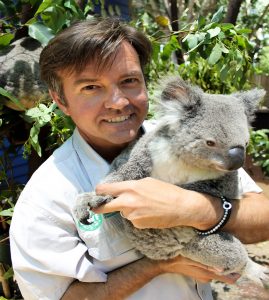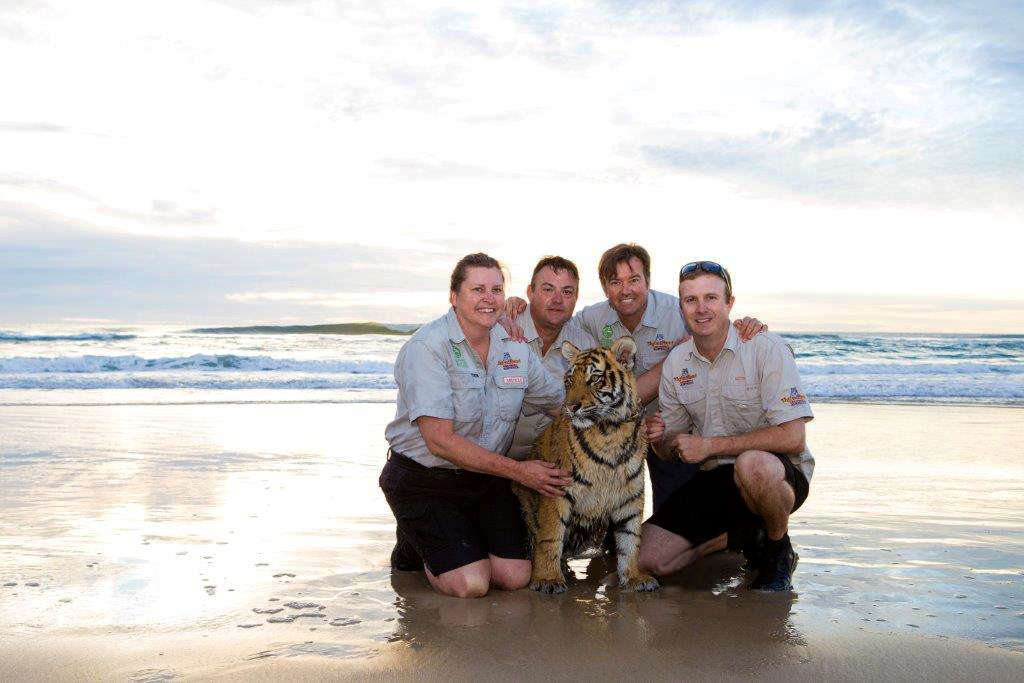
Working for Dreamworld, Al Mucci travels the world to spread the word on wildlife conservation initiatives and once shared a joke with Russian President Vladimir Putin while wrangling a koala at a photoshoot with world leaders at a G20 Summit.
If you ask Al, he’ll tell you he’s got the best job in the country. Al has worked at Dreamworld for more than a decade and is now general manager, life sciences and Dreamworld Corroboree.
Growing up in the western suburbs of Sydney, the son of post-World War II immigrants from Italy and Croatia, Al developed a love of exotic animals early in life. As a young boy, Al would roam nearby bushland catching local fauna.
“I always had an interest in animals and plants,” he explained. “I used to hang out at the creek a lot and catch animals and bring them home – my mum didn’t understand why I was doing this!”
But it was no surprise for Al’s parents that he chose to study environmental science after high school. Seeking a country adventure, Al moved to Bathurst to commence an Associate Diploma in Environmental Control at Mitchell College in 1987.
“I started the first year at Mitchell College [Charles Sturt University antecedent institution] and I finished at Charles Sturt University. I had so many great experiences, but the best was probably living on a property on the Blayney Road with the Lenahan family. I guess I wanted to experience the bush. There were four students living on this property and we had so much fun. It was an amazing three years and I wouldn’t swap it for anything.
“We used to round up the sheep late at night or early in the morning and you’d cruise around on your ag bike and see a tiger quoll running by. I thought that was pretty cool that these animals still existed and I was doing a course that meant I could maybe help animals like this through wildlife conservation.
“I could see that the urban sprawl was spreading out to them and I wanted to protect them. When I think back, I should have done more. I did ask the farmer to fence areas off so his sheep wouldn’t graze in the gullies, which helped, and it probably prolonged their existence, but once the urbanisation reached the border of his property the quolls pretty much disappeared. Now it’s likely they are locally extinct in the Bathurst peri-urban area.”
That desire to protect animals has been with him ever since. “What inspired me then still inspires me now, absolutely.”
Father’s lesson
As general manager, life sciences and Dreamworld Corroboree, Al manages the day-to-day activities associated with the care and upkeep of the 500-plus animals on site and interactive programs exploring Australia’s Indigenous heritage. Al also puts in one day a week with the Commonwealth Games as Indigenous relationships manager and helped launch the Commonwealth Games Reconciliation Action Plan in 2017.
When asked how the son of Italian and Croatian parents became aligned with Indigenous culture, Al said he was influenced by his father.
“Growing up, my father and two uncles worked for Transfield as riggers on the Snowy River Scheme. During that time Italians were treated much like new immigrants coming to Australia. While he was down there in the ’60s, he noticed there was segregation of black Australia – they weren’t getting the jobs and hardly had food – my father and his brothers didn’t understand how a country like this could be doing that to its Indigenous people.
“One of my passions is figuring out how people and animals can better live together and survive together.”
“My uncles and my dad used to go down to the creek and take their salami and breadsticks and eat with the local Indigenous people and show them some Italian culture while they were sharing generously some of their Aboriginal culture.”
Al took his father’s advice to heart when presented with an opportunity to incorporate Indigenous culture into the fabric of Dreamworld. Al approached Reconciliation Australia and was instrumental in establishing a Reconciliation Action Plan for Dreamworld, the first leisure-based company in Australia to do so.
The company began engaging with the local people and other language groups, and it was through this engagement that Dreamworld Corroboree – interactive experiences celebrating Indigenous Australian heritage, culture, wildlife and story – was born.
“It was the Elders’ project, I just facilitated it happening. They all came and started working with Dreamworld on this because of their relationship with me and together we made things happen. They were shocked that a little white Italian boy was doing this!
“The proof is in the pudding here at Dreamworld. We’re the largest private employer of Aboriginal and Torres Strait Islanders on the Gold Coast and we’ve built the capability of local Indigenous businesses. They’ve grown both personally and professionally while Dreamworld has grown with them.”
Advice to live by
Al is quick to describe his job in wildlife conservation wildlife conservation in Australia as the most privileged role in the country.
“The best part of my job is all of it! Working for a private company that backs my judgement and my intent when it comes to wildlife conservation and working with Indigenous people is not something I take lightly. I’m humbled by their generosity to me, which then drives me to do more.”
Al said some of the best advice he ever received came while studying in Bathurst.
“As young students coming through, you always worry about where your career path is going to go. My first year I worried about where my career was going but Mr Lenehan sort of took me under his wing and he kept encouraging me, ‘You’ll be fine Al. A person like you will go far.’
“So, to all those students at Charles Sturt, I say to them, ‘If you’ve chosen a course at Charles Sturt, that’s great. A person like you will go far.’”
Want to explore your passion for wildlife conservation in Australia?
If you’re ready to live your dream career in wildlife conservation in Australia just like Al, Charles Sturt University offers environmental science degrees that will open up opportunities in a career close to your heart, in wildlife conservation and beyond. Become an advocate for environmental sustainability so future generations can experience and enjoy our natural environments. Make your mark on the world through environmental preservation and restoration or share your passion for the outdoors with others.


You must be logged in to post a comment.